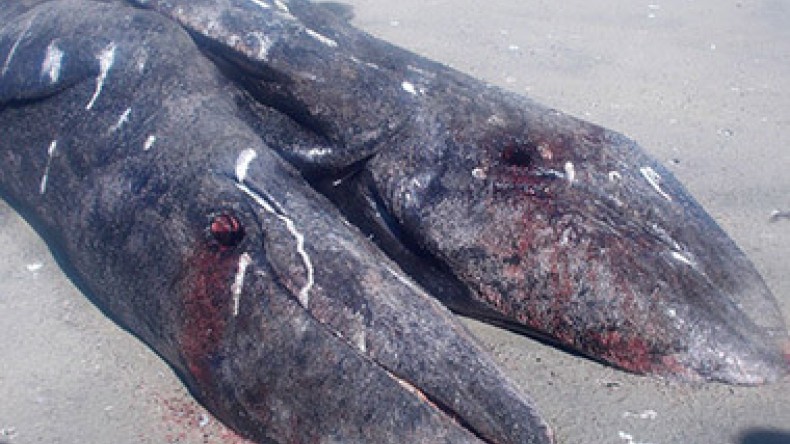
Two-headed whale found in Mexico: is Fukushima radiation responsible?
Fishermen have found conjoined gray whale calves in a northwestern Mexican lagoon, a discovery that a government marine biologist described as "exceptionally rare," the Voice of Russia said.
The four-meter (13-foot) long siamese whales were dead when they were discovered in the Ojo de Liebre lagoon, which opens to the Pacific Ocean in the Baja California peninsula. Could this be connected to radioactive water being dumped into the Pacific Ocean from the Fukushima nuclear plant?
Officials from the National Natural Protected Areas Commission (CONANP) verified the discovery during a visit on Monday.
The nearly half-tonne creatures were joined at the waist, with two full heads and tail fins, said Benito Bermudez, a marine biologist and CONANP's regional manager.
He described the discovery as "exceptionally rare, without any precedent" in the region.
Scientists are examining the whales and plan to look for any other cases in the gray whale's natural sanctuaries off Baja California.
Every winter, hundreds of gray whales migrate from the Bering Sea to the warmer waters of Baja California, attracting tourists hoping to catch a glimpse of the huge mamals.
Nearly 1,200 gray whales were spotted in the region in the 2012-2013 season.
According to experts, ocean currents carry harmful substances far away. Even in other parts of the world fish and seafood drawn from contaminated streams can be dangerous for humans, Maxim Shingarkin, Deputy Chairman of the State Duma Committee for Natural Resources says.
"Currents in the World Ocean are so structured that the areas of seafood capture near the US north-west coast are more likely to contain radioactive nuclides than even the Sea of Okhotsk which is much closer to Japan."
Contaminated fish can swim anywhere, so fishing is not absolutely safe in any region of the world any more. It is impossible to test the entire catch for pollution, just as it is impossible to introduce a universal ban on fishing. The Japanese government has just partially banned fishing in the most dangerous areas. Vladimir Slivyak, Co-chairman of the Ecodefence international ecology group is speaking.
As for atmospheric pollution, radio nuclides from Fukushima reached California and Mexico 8 days after the accident. Russia was not affected, Maxim Shingarkin says.
Newsfeed
Videos






























